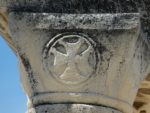At the beginning of His earthly ministry Jesus began calling followers, but He didn’t look for the high achievers in religion, education, or popularity. He gathered a ragtag bunch of men who had few qualifications
Jesus Calls Matthew
9 As Jesus passed on from there, He saw a man called Matthew sitting at the tax booth, and He said to him, “Follow Me.” And he rose and followed Him (ESV)
To modern readers this may seem like an abrupt response from Matthew, but it’s not completely unusual. Jesus’s fame had been spreading around Galilee, so Matthew had surely heard a lot about Him already and perhaps had heard Jesus’s teaching in the Sermon on the Mount (Matt. 5-7). It was not uncommon for teachers to call followers in this way.
Jesus wasn’t looking for any random group of followers, but for a handful of faithful disciples (students) who would eventually become apostles (messengers). He had already called several others, including at least Simon Peter, Andrew, James, and John in chapter 4. In Matthew 10, the twelve are named and sent out as apostles.
Matthew (also known as Levi) the tax collector was the same person who eventually wrote this book of the Bible, but as a tax collector he would have been thoroughly unpopular. He was likely wealthy, and a pariah among his people because he was collecting funds from Jews to support the Roman occupation.
Tax Collectors and Sinners
10 And as Jesus reclined at table in the house, behold, many tax collectors and sinners came and were reclining with Jesus and His disciples.
These sinners were known for failing to uphold the Jewish law. They had reputations in the community. Sin had become their identity. For Jesus to sit down to eat with them was to identify with them, and could sully His own reputation.
11 And when the Pharisees saw this, they said to His disciples, “Why does your teacher eat with tax collectors and sinners?”
The Pharisees were separatists, the religious elite among the Jews. They were meticulous about observing every detail of the law and they made sure everyone knew it. They passed judgment on those who didn’t live up to their standards, and they felt compelled to point out the scandal of Jesus’s behavior of associating with known sinners.
Who Needs a Doctor
12 But when He heard it, He said, “Those who are well have no need of a physician, but those who are sick.
Jesus is quick to point out that healthy people don’t need doctors. The sick need a doctor, and sinners need a Savior. Jesus is for sinners what doctors are for the sick. By associating with sinners, He is not condoning their sin, but He is loving them and leading them to the cure they need.
Some people will complain, “I’m never going back to that church, because it’s full of hypocrites.” The fact is that every church is full of sinners! The only hypocrisy would be pretending we were perfect. Hopefully we go to church because it is a safe place for sinners to meet the Savior. Healthy people generally don’t hang around the doctor’s office, and the self-righteous don’t hang around the church. Those who know they are sinners saved by grace should be the most welcoming of all communities. We open our doors to sinners and messy people, because we know our own neediness.
Mercy, Not Sacrifice
13 Go and learn what this means: ‘I desire mercy, and not sacrifice.’ For I came not to call the righteous, but sinners.”
Religious activities don’t earn God’s approval. Good works don’t earn salvation, though salvation will lead to certain changes in behavior. The Pharisees thought that perfect obedience to the law, along with animal sacrifices for any possible sins, were the key to salvation. But even in the Old Testament there were multiple times when God told the people that it wasn’t about the sacrifices (e.g. Hosea 6:6, Psalm 40:6, Micah 6:6-8). No kind of religious activity can earn God’s love—going forward at a crusade, getting baptized, being born in a Christian family, tithing, or being a moral person. Those are all good things, but they can’t save us.
We need God’s mercy to save us from our sins, not our own perfect performance. We’re not righteous people in need of a minor tune-up, but sinners in need of a Savior. Jesus invites all sinners to come to Him to receive His righteousness by faith. We were dead in our sins, but Jesus brings us new life (Eph. 2:1-7). We may not think of ourselves as sinners, but no person is righteous apart from Jesus Christ. The Apostle Paul was originally a Pharisee, but after encountering Jesus he proclaimed, “But whatever gain I had, I counted as loss for the sake of Christ. Indeed, I count everything as loss because of the surpassing worth of knowing Christ Jesus my Lord” (Phil. 3:7-8).
It doesn’t matter whether our identity is tied to our sin or to our self-righteousness. Either way, Jesus welcomes us with open arms and gives us a new identity as children of God.
“For all have sinned and fall short of the glory of God, and are justified by His grace as a gift, through the redemption that is in Christ Jesus” (Romans 3:23-24).
Application Questions
1) Do you tend to identify yourself or others by sin patterns? How does Jesus respond to those who know they have sinned? (E.g. Matt. 9:1-8, Luke 7:36-50, John 8:1-11.)
2) Jesus’s harshest words were for the self-righteous Pharisees (Matt. 23:1-36). How can Christians be on guard against Pharisaical attitudes?
3) Dietrich Bonhoeffer wrote, “Many Christians are unthinkably horrified when a real sinner is suddenly discovered among the righteous. So we remain alone with our sin, living in lies and hypocrisy” (Life Together). Do you think our church is a safe place for people to be honest about their sin and to “walk in the light” (1 John 1:7)? Are you someone who can be trusted to respond to confessions with love and confidentiality?







